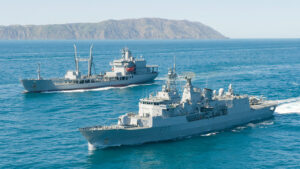As the Indo-Pacific emerges as the most strategically contested maritime domain, the partnership between India and France is a beacon of stability and resilience. India’s maritime expansion aligns closely with France’s vision of an “inclusive Indo-Pacific,” setting the stage for a robust alliance that supports both defence and development in the region. This partnership is growing through defence cooperation, shared commitments to climate security, and direct engagement with Indo-Pacific island nations—all with the Indian Navy playing a central role.
Shared Vision for an Inclusive Indo-Pacific
India and France have converging ambitions for the Indo-Pacific, recognising the region’s role in shaping future geopolitics. As the only European nation with territories in both the Indian and Pacific Oceans, France is a natural partner for India, bringing its presence, expertise, and resources to the table. For India, the Indo-Pacific represents more than just maritime security; it embodies a vision of collaborative growth, sustainable development, and balanced power dynamics.
The Indian Navy’s commitment to the Security and Growth for All in the Region (SAGAR) framework perfectly complements France’s strategic autonomy. India’s leadership as a resident power in maritime affairs has bolstered its influence among Indo-Pacific nations. The Indian Navy’s outreach to these countries fosters a balance of power that counters coercive tactics in the region, with France reinforcing these efforts. The July 2023 India-France Indo-Pacific Roadmap highlight these shared priorities, highlighting cooperation in maritime security, climate resilience, and sustainable development, all contributing to a secure and prosperous Indo-Pacific.
Strengthened Defense Ties and Technology Sharing
Defence trade and technological cooperation are cornerstones of the Indo-French relationship. In October 2023, India formally requested 26 Rafale Marine aircraft, adding a critical capability to the Indian Navy’s fleet. This $6 billion deal is not merely a transaction but a step toward a more robust, interoperable Indo-Pacific alliance. French Rafale Marines are expected to operate seamlessly with Indian assets, symbolising the integration and trust between the two countries.

India has long benefited from France’s commitment to local defence manufacturing. The successful Project P-75 submarine collaboration between India’s Mazagon Dock Limited and France’s Naval Group has produced highly capable Kalvari-class submarines. In 2023, both parties signed an agreement for three additional Scorpene-class submarines, further underlining France’s role as a trusted technology partner. These initiatives align with India’s Make in India goals, reflecting how the Indian Navy’s growth leverages global expertise while cultivating domestic defence capabilities.
During the 2024 Annual Defense Dialogue in Paris, both nations discussed deepening industrial partnerships and co-developing defence equipment, including submarines and jet engines. This roadmap for defence industry collaboration exemplifies the strategic trust between India and France, a partnership rapidly becoming one of the cornerstones of India’s naval modernisation.
Joint Exercises and Regional Security Initiatives
The Indo-French relationship goes beyond procurement, evolving into a vibrant partnership based on real-time joint exercises and shared operational knowledge. The Varuna exercise series, a flagship bilateral engagement, epitomises this synergy. Held annually, Varuna has grown in scale and complexity, showcasing the readiness and professionalism of both navies as they operate in high-stakes scenarios. The 22nd edition of Varuna, conducted in September 2024 in the Mediterranean Sea, featured anti-submarine warfare, air defence drills, and other advanced operations that spotlight the deepening defence collaboration between the two navies.
France and India’s commitment to a secure Indo-Pacific is further reinforced through multilateral exercises such as La Perouse, which brings together navies from Australia, Japan, and the United States. The Indian Navy’s regular participation enhances tactical coordination and signals India’s pivotal role in securing a free and open Indo-Pacific. Meanwhile, strategic port calls—such as the recent arrival of INS Talwar at La Réunion on October 27, 2024—demonstrate India’s operational reach and commitment to collaborative security efforts, solidifying its presence in the French territories of the Indian Ocean.
Supporting Non-Traditional Security: Climate Resilience and Disaster Relief
Both countries recognise that security in the Indo-Pacific transcends military might. Climate change, natural disasters, and resource security are key issues that demand non-traditional responses, and India and France are well-positioned to lead the way. The Indian Navy’s exemplary track record in Humanitarian Assistance and Disaster Relief (HADR) missions aligns seamlessly with France’s expertise in climate security. Together, they have engaged in capacity-building exercises that empower Indo-Pacific nations to confront these shared challenges.

France’s Kiwa Initiative in the Pacific, designed to support local climate adaptation projects, and India’s own disaster response framework underscore how both countries view climate resilience as essential to security. Their participation in regional organisations such as the Indian Ocean Commission (IOC) and the Indian Ocean Rim Association (IORA) amplifies their collective impact. For instance, when the leaders of Seychelles, Mauritius, Madagascar, and Comoros met with Indian and French counterparts in 2019, it underscored a unified commitment to sustainable development and maritime security.
Island States Diplomacy and Multilateral Engagement
Island nations in the Indo-Pacific are strategic partners for both India and France, serving as vital allies in their Indo-Pacific policies. India’s longstanding diplomatic engagement with the Pacific Islands, highlighted by the Forum for India-Pacific Islands Cooperation (FIPIC), has strengthened New Delhi’s rapport with these nations. France has complemented this approach with its Pacific outreach, supporting regional dialogues and hosting defence forums.
This diplomacy with island states allows India and France to offer sustainable, development-driven alternatives to coercive regional tactics. As France hosts exercises like Croix du Sud in New Caledonia, the Indian Navy’s expertise in the Indian Ocean region brings valuable insights into coordinated regional security efforts. Both countries enhance their influence in an increasingly competitive region by working alongside island nations to address climate change, build infrastructure, and bolster resilience.
Challenges and Future Pathways
Despite the robust alliance, India and France must navigate certain sensitivities to sustain their momentum. India’s anti-colonial legacy occasionally contrasts with France’s historical ties in the region, requiring careful diplomacy. Additionally, minilateral alliances like AUKUS remind partners of the need for transparent and consistent dialogue. Frequent Track 1.5 and Track 2 engagements will be crucial in preserving the Indo-French rapport amidst evolving Indo-Pacific coalitions.
India and France have opportunities to expand non-traditional security cooperation, focusing on disaster resilience, marine research, and people-to-people exchanges. Programs like the Indo-Pacific Triangular Cooperation Fund, which targets climate resilience and SDG-focused initiatives, could be a robust framework for Indo-French collaboration in third-party countries.
Anchoring Regional Stability and Resilience
As India and France fortify their maritime relationship, the Indian Navy becomes a central pillar in securing a stable and resilient Indo-Pacific. This alliance balances military strength with developmental goals through defence procurements, joint exercises, and climate initiatives, setting a high standard for responsible regional leadership.
India and France’s strategic vision fosters a maritime partnership that goes beyond defence, anchoring itself in shared values and long-term regional prosperity. The Indian Navy’s operational expertise and France’s technological acumen create a formidable force for peace and progress, advancing a collaborative approach to Indo-Pacific security that promises to benefit both nations and the broader region.
Author

Aritra Banerjee is a Defence, Foreign Affairs & Aerospace Journalist, Co-Author of the book ‘The Indian Navy @75: Reminiscing the Voyage’ and was the Co-Founder of Mission Victory India (MVI), a new-age military reforms think-tank. He has worked in TV, Print and Digital media, and has been a columnist writing on strategic affairs for national and international publications. His reporting career has seen him covering major Security and Aviation events in Europe and travelling across Kashmir conflict zones. Twitter: @Aritrabanned















